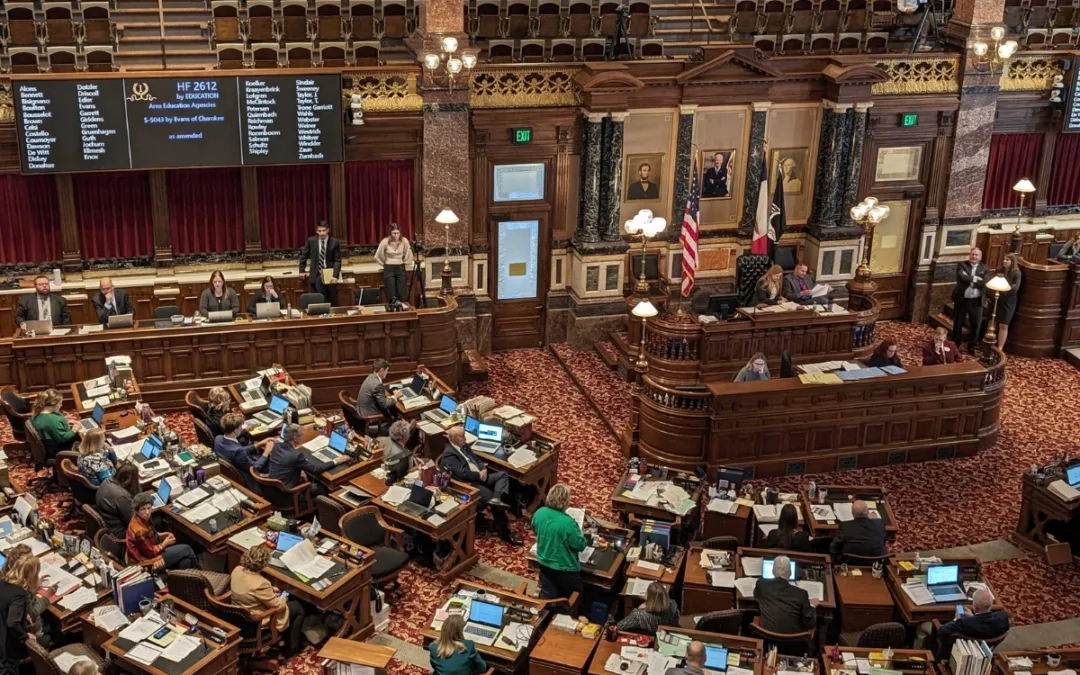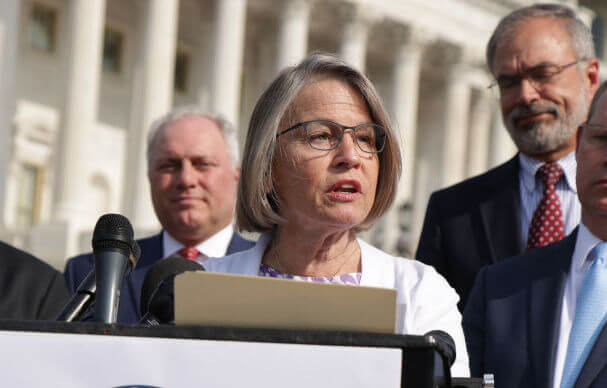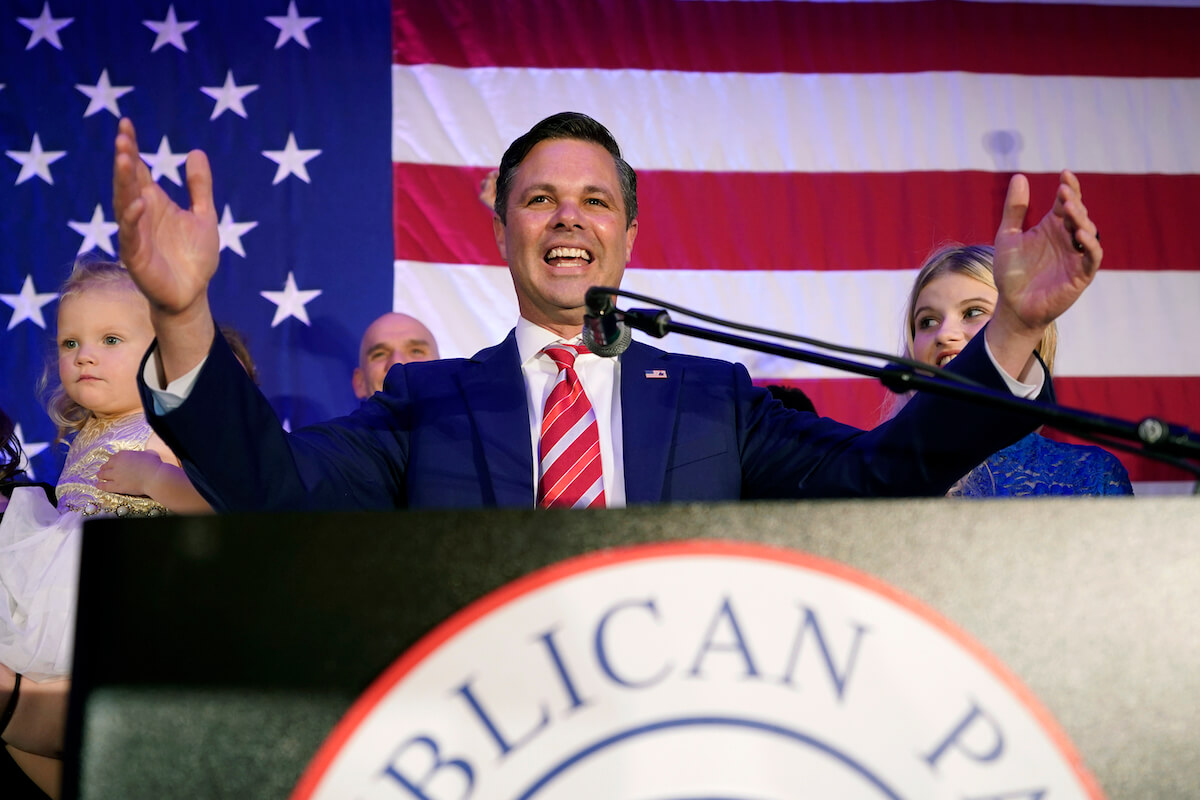
Iowa Gov. Kim Reynolds. (AP Photo/Charlie Neibergall,
After years of enabling Donald Trump and his abhorrent behavior, some of Iowa’s most prominent Republicans—including Gov. Kim Reynolds—staked their reputations and clout on other caucus candidates in an attempt to move on from the former president.
On Monday, they learned how deeply they failed to convince the base of their party to move on. Trump coasted to a record-setting caucus victory that was called for him before a majority of caucus-goers even had a chance to cast their ballot. To quote Omar Little: “If you come at the king, you best not miss.”
“Today, Reynolds is much diminished,” said David Yepsen, a former Des Moines Register chief political reporter and “Iowa Press” host. “She upset [and] alienated a lot of Republicans with her endorsement and very active campaigning by DeSantis’ [side]. That goes against historic practices of leading Iowa politicians to sort of stay out of this thing.”
Reynolds broke with tradition when she endorsed Florida Gov. Ron DeSantis in the caucus, hoping her hard-earned political capital and popularity with Iowa Republicans could swing the race.
She also may have been emboldened after successfully flexing the power of her endorsement in a highly-contested Ankeny school board race in 2021, and in 2022, when she helped oust a dozen or so House Republicans who did not support her school voucher plan.
DeSantis finished in a distant second place in the caucus and narrowly edged out former South Carolina Gov. Nikki Haley, who was within earshot of him.
Megan Goldberg, an assistant professor of American politics at Cornell College in Mount Vernon, also pondered Reynolds’ decision to directly endorse in this race after her initial vow of neutrality.
“To me, if I’m Reynolds, endorsing DeSantis seems like a wild card because we’ve seen how Trump treats his political enemies even if they’re in his own party, and that’s not a position you want to be in,” she said.
Iowa State University (ISU) Political Science Professor Dave Peterson thought it was “brave” of Reynolds to publicly endorse someone other than Trump, but agreed Reynolds should have probably broken ties sooner if she was going to take this route.
“She could have easily just sat by the side and said, ‘Look, it’s a tradition that Iowa governors don’t endorse, and I’m going to stay out of this,’” he said. “But she clearly thought DeSantis was a better choice than Trump for whatever reasons—she has her reasons for that— and decided to try to do what she could to make it so that Trump wasn’t the nominee. And that took some courage.”
It was a classic case of too little, too late for Reynolds and other Republicans who opposed Trump.
‘She made her choice’
For years, Iowa’s establishment Republicans have embraced Trump’s MAGA movement and used its momentum for their political gain, while semi-embracing the authoritarian figure at the helm. There were key electoral reasons for that—Trump turned out new voters for the Republican ticket in Iowa and super-charged the trend of blue-collar voters shifting to the right.
While it’s been an open secret behind the scenes that Reynolds and other Iowa Republican establishment figures do not personally like Trump, you couldn’t tell it from their public behavior. And, likely, neither could the Republican voter base in Iowa. Which made it that much harder for Reynolds and other establishment figures to turn their voter bases against Trump after defending him for so long.
Reynolds rallied with the former president multiple times during his time in office and he showed up to one of her final campaign events before the 2018 election that made her the first woman to win an Iowa gubernatorial election. Reynolds visited the White House in 2020 to talk about the coronavirus’ impact on the food supply, and up until last summer, would jump to Trump’s defense whenever a new criminal allegation was filed against him.
Trump’s team had enough footage of Reynolds singing his praises over the years that they cut and released an ad of her numerous glowing remarks shortly after she formally endorsed DeSantis in the caucus.
DeSantis presented an opportunity for a clean slate for Iowa Republicans. Here was a politician who had similar political beliefs as Trump (and Reynolds), but who did not come with the additional baggage of facing 91 criminal charges.
In addition to Reynolds, Iowa Senate President Amy Sinclair, Iowa House Majority Leader Matt Windschitl, many other GOP legislators, and influential evangelical leader Bob Vander Plaats all endorsed DeSantis.
Yepsen, the former reporter and host, thinks religion partly played a role in why so many of Iowa’s most prominent Republicans went against what was essentially an incumbent candidate in their party.
“All of those DeSantis people, I think there are a lot of evangelicals and a lot of conservatives that are disgusted by Donald Trump,” Yepsen said. “Instead, they are going to go with the guy who has the same sort of good conservative principles.
“They’re not saying anything bad about Trump, but they’re going with DeSantis,” he continued. “That’s just a thread I can see running through Reynolds and Bob Vander Plaats and a lot of those people who were working for DeSantis—they’re pretty religious people.”
Goldberg, the Cornell professor, thinks there’s something to Yepsen’s observation. She noted Trump doesn’t fit the mold of a typical evangelical candidate and many had to “hold their nose and vote for him,” but his appeal went beyond just faith.
“It’s white Christian nationalism,” Goldberg said. “Even if Trump himself doesn’t espouse these personal religious beliefs that evangelicals do, he shows this vision, at least rhetorically, of a time when white and Christian were synonymous with being American, which of course is what white Christian nationalism is about.”
The Iowa political experts Starting Line interviewed also considered that Reynolds might be worried about Trump’s electability in the general election due to all of his alleged criminal misdeeds.
“If she has electability concerns, it would make sense for her to do what she did,” said Peterson, the ISU professor. “She can’t say that though, right? Or she can’t say that very clearly. Because it’s hard. You get in trouble if you criticize Trump too much.”
University of Iowa Assistant Political Science Professor Tim Hagle agrees this could be a motivating factor.
“With Trump’s political difficulties, his legal difficulties, that will make it that much easier—as the expectation is—for the Democrats to demonize him like they did for 2020,” he said. “So they wouldn’t be able to do that with DeSantis, but certainly they would find other criticisms of DeSantis, but she made her choice.”
‘Overestimated her influence’
The public fractures between Trump and Reynolds surfaced last July when Trump held his first major rally of the cycle in Council Bluffs. Reynolds was not there. The night before the rally, she co-hosted an event with Florida First Lady Casey DeSantis.
Trump attacked Reynolds on his Truth Social media platform after her no-show and regularly lobbed shots at her during his Iowa campaign speeches. The mention of her name at his rallies would sometimes draw boos in a state where she won reelection in a landslide a year prior.
Publicly, Reynolds rarely returned fire against Trump outside of a one-off November tweet on her official account. But on her since-banned secret Twitter account, Reynolds liked and shared many anti-Trump, pro-DeSantis posts. One retweet from Reynolds even took an implied shot at Trump’s promiscuity, contrasting an image of Trump surrounded by random women with a photo of DeSantis with his family.

Kim Reynolds retweeted this tweet comparing DeSantis to Trump on her unofficial Twitter account.
“Reynolds is really popular, but it’s unclear if Reynolds is popular because Trump is popular and they share the same party or is Reynolds popular and she helps Trump? I think it’s pretty clear that the first part was true, not the second part,” Goldberg said.
“I don’t know if she overestimated her influence. That’s my best guess, is that Reynolds has been doing well enough in Iowa that she felt like she had political capital that she just didn’t have.”
Even before Monday’s results came in, Reynolds told Fox News she would support whomever the Republican nominee for president is no matter who. When the host mentioned that Trump had personally attacked her on multiple occasions, she held firm.
“I’m a Republican and we need to make sure that we don’t re-elect President Biden for another four years,” Reynolds said.
Peterson said the caucus said a lot about the state of the Republican Party in Iowa and nationally. He noted that in the five surveys of Iowa Republican voters he conducted before the caucus, more than half of them unapologetically liked Donald Trump and no other Republican candidates did enough to convince them not to support Trump.
“This entire race within the Republican Party was a referendum on Donald Trump and none of the candidates did anything, and Kim Reynolds didn’t do anything to convince people to see this as anything other than that,” Peterson said.

Iowa to deliver SNAP recipient data to the federal government
Iowa will comply with a federal order to give Social Security numbers and other data to the federal government without resistance. Privacy advocates...

Iowa senator accused Republican leadership of ‘bullying tactics and threats’ over eminent domain vote
A Republican state senator is raising the alarm about his own party leaders retaliating against him after he joined an effort to force a vote on...

Pete Buttigieg heads to Iowa for May town hall
A progressive veterans group will host Pete Buttigieg for a Cedar Rapids town hall this month to discuss the impact the Trump administration’s...

Inside Miller-Meeks’ million dollar haul: Washington D.C. donors, PAC money
The race for Iowa’s 1st Congressional District is shaping up to be the most competitive in 2026. And US Rep. Mariannette Miller-Meeks' first quarter...

‘What changed, Chuck?’ Grassley faces angry crowd at Iowa town hall
Angry constituents greeted Sen. Chuck Grassley at a town hall in North Iowa on Friday morning. Why wouldn't he answer their phone calls and emails?...

VoteVets targets Rep. Zach Nunn on Veterans Affairs cuts
A veterans voter education group is going after US. Rep. Zach Nunn in a new campaign over the Trump administration’s sweeping cuts to the US...




